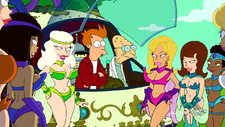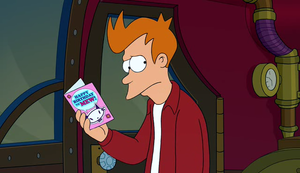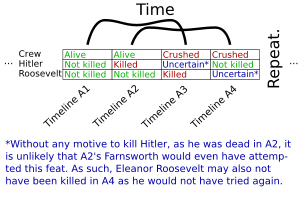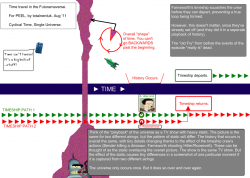Difference between revisions of "The Late Philip J. Fry"
m (Reverted edits by 213.81.85.246 (talk) to last revision by 90.204.116.152) |
(→Trivia) |
||
| Line 125: | Line 125: | ||
*The fashion of the 3050's as well as the design of the time machine resemble steampunk. | *The fashion of the 3050's as well as the design of the time machine resemble steampunk. | ||
*Zoidberg is alive in 3030 which means that he probably hasn't yet experienced the mating frenzy. | *Zoidberg is alive in 3030 which means that he probably hasn't yet experienced the mating frenzy. | ||
*The final Universe appears to have Cartoon Physics as the time machine is unaffected by gravity until the Professor stops talking. | |||
=== Allusions === | === Allusions === | ||
Revision as of 03:20, 19 December 2014
| ← Previous | Navigation in production order | Next → |
|---|
| Season 6 episode Broadcast season 7 episode | |||||
| The Late Philip J. Fry | |||||
|---|---|---|---|---|---|
| No. | 95 | ||||
| Production number | 6ACV07 | ||||
| Written by | Lewis Morton | ||||
| Directed by | Peter Avanzino | ||||
| Title caption | If you don't watch it, someone else will | ||||
| First air date | 29 July, 2010 | ||||
| Broadcast number | S07E07 | ||||
| Nomination(s) | Emmy Awards Primetime Emmy Award for Outstanding Animated Program (for Programming Less Than One Hour), 2011 (Won)[1] | ||||
| Additional | |||||
| |||||
| Season 6 | |||||
| |||||
"The Late Philip J. Fry" is the ninety-fifth episode of Futurama, the seventh of the sixth production season and the seventh of the seventh broadcast season. It aired on 29 July, 2010, on Comedy Central. After the Professor invents a forward time machine, he, Fry and Bender accidentally go into the year 10,000. To return, they must keep going further into the future until an era when a backwards time machine has been built.
The episode won the 2011 Emmy Award for "Outstanding Animated Program".[1]
The Story
Act I: "Time?! I can't go back there!"
Fry is unable to sleep when Bender brings a female robot to their apartment and they spend all night loudly having sex (as well as intentionally keeping Fry awake). As a result, Fry oversleeps and shows up late for work at Planet Express the next morning. The Professor chides Fry for his chronic lateness, saying that he expects Fry to show up for work on time, just like all the other employees; when Fry points out that Leela hasn't arrived yet, he is told that Leela came in on time, but left because a man was taking her out to lunch for her birthday. Fry realizes that he was supposed to take Leela to lunch, and is now late for that as well. Fry arrives at Elzar's restaurant to meet Leela, but Leela has already finished her meal (and Fry's); she, like the Professor, is fed up with Fry's inability to be on time for anything.
Upon returning to Planet Express headquarters, Fry offers to make his earlier blunder up to Leela by taking her out to the ritzy, subterranean Cavern on the Green restaurant that night. Leela is skeptical, particularly when Bender announces that Hedonism Bot is getting married to a house in the suburbs and will be throwing a huge bachelor party that same evening, but Fry says that he "can throw up on a stripper any time", and promises that he will not stand Leela up again. Fry purchases a record-your-own-message birthday card for Leela and prepares to leave so he can meet her precisely on time, but is stopped by the Professor, who tells Fry that since he was late for work that morning, he must help the Professor test his latest invention: a time machine. The Professor says that the machine was designed to only travel forward in time so as to avoid altering history or doing "something disgusting", like sleeping with one's own grandmother.[3ACV19]
Fry, Bender, and the Professor enter the machine. Fry begins recording an apology for being late again on Leela's birthday card, while the Professor intends to test the machine by sending it one minute forward in time. However, the Professor trips and falls down while clutching the activation lever, sending the machine hurtling out of control; in the process, Fry loses Leela's birthday card out the window. The Professor gets back to his feet and shuts down the machine, but the occupants find that the interior of the Professor's laboratory has been replaced by a ruined city. The date on the machine's display reads: 3 December, 10,000 AD.
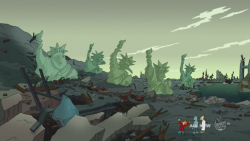
Act II: "Did you even see that mountain of skulls?"
Fry is stunned at being thrown so far forward in time, saying that he can't be late for his date with Leela; however, the Professor reminds Fry that Leela, as well as everyone else they have ever known, has been dead for thousands of years. The trio explore their ruined world, but are unimpressed with the post-apocalyptic setting. After talking to a group of cavemen, the Professor realizes that while they cannot travel backward in time, they can travel forward to a point where someone else has invented a backward-traveling time machine, and use that to return home. They make a series of progressively larger jumps through time while attempting to find a sufficiently advanced civilization, and while they encounter a number of strange sights, they have no luck in finding a way home.
Back in 3010, Leela endures another lonely birthday dinner. When she returns to Planet Express, she inquires as to Fry's whereabouts, and is told by Cubert that he, Bender, and the Professor are probably attending Hedonism Bot's bachelor party. Just then, a breaking news bulletin states that a nuclear-powered stripper robot underwent meltdown at the party, killing everyone except Hedonism Bot. Leela is overwhelmed with both anger and grief, believing that Fry died after standing her up again.
Bender, Fry, and the Professor arrive in the year Five Million AD; a race of enlightened, purple-skinned humanoids live on Earth's surface, while Dumblocks - savage, primitive creatures - live below ground. The Professor asks whether these advanced people have invented a backwards-traveling time machine, and is told that they have not, although if they focus their mental efforts toward the problem, they should be able to perfect a solution within five years. The three promptly jump forward another five years, only to discover that in that time, the Dumblocks have risen up and slaughtered the entire surface population.
In 3030, Planet Express has become a larger, more successful company following the death of the Professor and Leela's subsequent takeover of the business. Leela is proud of her success, but admits to Hermes that she still misses "the old days" while looking at a photograph of herself and Fry. Leela notices that Cubert has grown up to possess a strong physical resemblance to Fry, and begins to flirt with him, much to his surprise.
The year Ten Million AD is a nightmare where machines are engaged in a violent, genocidal war against the remnants of mankind. Bender cheerfully observes that this "seems like a nice future", and suggests that they remain there, but the Professor and Fry quickly engage the next jump. They next arrive in Fifty Million AD, a paradise inhabited by beautiful and brilliant women who immediately recognize the group as time travelers and actually have a method of traveling back in time. Fry and the Professor are invited to a sensual "fertility banquet", but Bender, unhappy about being unable to stay in the future he liked, spitefully activates the time machine. This triggers a fight among the three, and they travel a large distance forward in time, finally arriving in One Billion AD.
Here, in the far future, Earth has been reduced to a scorched, barren wasteland, and all life is extinct. Fry wants to keep traveling forward, but the Professor says this would be futile, as Earth is now a dead world. Distraught, Fry wanders back to the remains of the Cavern on the Green, where he apologizes to Leela for being a billion years late for her birthday dinner. Glancing down at the ground, he is shocked to find a message written there, one that is apparently addressed to him.
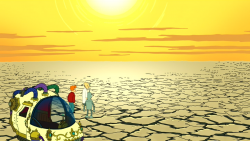
Act III: "I made it, Leela. Sorry I'm a billion years late."
In 3050, Planet Express has become a massive corporation. An aged Leela and Cubert are divorced, and Cubert is now dating Amy, who has become a head on a robotic body. While discussing her regrets over marrying Cubert with Hermes (who is a head in a jar on a pogo stick), Leela is struck by her birthday card from 3010, which has finally emerged from the time stream. Leela opens the card to hear Fry's message, in which he explains he will be delayed by the Professor's time travel experiment, and tells her that he loves her, before the experiment visibly goes awry. Leela is crushed; she has spent the last 40 years being bitter and angry with Fry for something that wasn't even his fault. Dejected, she returns to the abandoned Cavern on the Green, and - drawing upon a lesson about stalagmite formation she learned from a waiter the last time she was in the restaurant - fires her laser pistol at the ceiling several times, causing droplets of water to fall to the floor. Satisfied, Leela nods her head and leaves.
By One Billion AD, these droplets of water have accumulated into a series of small stalagmites which spell out a brief message from Leela to the time-lost Fry, stating that while their time together was short, it was also the happiest of her life. Touched by the message, Fry returns to Bender and the Professor, saying that he has lived a good life, and proposes that they watch the end of the universe together. Turning the time machine to its maximum setting, they watch as the sun grows into a red giant, consuming the earth, and then fades into a white dwarf, followed by all of the other stars, eventually leaving nothing but darkness. This, to their astonishment, is followed by a tremendous explosion that the Professor recognizes as a second Big Bang; he realizes that time must be cyclical, resulting in the creation of a new universe that should be identical to the previous one.
The time machine rapidly accelerates through the formation of the Earth, the extinction of the dinosaurs, and subsequent events in world history (with the Professor pausing only briefly to assassinate Adolf Hitler with a laser cannon). As they near their own time, they throttle the machine back, but accidentally skip forward to 10,000 AD a second time after the Professor falls down once more, forcing them to "go around again". The third trip happens without incident (although this time the Professor fails to kill Hitler and mistakenly shoots Eleanor Roosevelt), and the time machine materializes in the Professor's lab a short time before it originally left. However, this universe appears to be displaced a few feet from the last one, as the machine appears in mid-air and crashes to the floor, killing this new universe's versions of Fry, Bender, and the Professor (and avoiding a time paradox). Fry is able to make his date with Leela on time; she admits that she thought he would be late, but he replies that was "the old Fry... he's dead now". Fry and Leela share a romantic moment atop a bridge, while beneath it, Bender buries the bodies of the deceased duplicates.
Time travel
- Further information: Time travel
In this episode, Futurama deals with a different kind of time travel than episodes such as "Roswell that Ends Well" and Bender's Big Score . The crew travel forwards, and "only" forwards. This originally caused the emergence of multiple explanations amongst fans of the show for the question of how the PX crew actually got ‘’back’’ to their original time frame.
The two theories postulate either a cyclical timeline (Cyclical Time), or a cyclical deterministic universe (Cyclic Universe) in which the vacuum resulting from the decay of the last subatomic particles gives rise to a new quantum vacuum fluctuation that spawns an identical universe to the previous one via a second big bang.
Within the Cyclic Universe model, the “second” big bang is simply one of an infinite series, and the crew that travel through time are not the first to do so. They are part of an infinite chain, stretching throughout infinity. They do not ever return to their own time, merely to an identical copy, two universes “further down” the “chain” of linked big bang events and subsequent universal decay.
The major evidence to support this theory is a line from the Professor. When the big bang is observed by the timeship crew, he states that it “appears to be a ‘’second’’ big bang” and that the crew are in a ‘’new’’ universe that is identical to the old one.
This model doesn’t match up well with the time traveling exploits of the crew in previous episodes. In this model, when a universe ends an equal version is created in its place. It is not an alternative universe, but rather a recreation of the very same universe, in which all living things are recreated and everything that happened in the previous universe happens again (unless time travelers change it, of course). Or in short, any parallel/alternative universe must always contain a version of its own universe. This follows a highly deterministic model, where any event is effectively “set” and in theory any single “random” event could be predicted by looking at the interactions of all particles since the original event (the big bang) that set things in motion.
The Cyclical Time theory allows for random and nondeterministic fluctuations within events, and fits in with previously established methods of time travel.
This has been described as the "wheel of time", a concept in some religious and philosophical traditions. In this scenario, upon reaching the end of time the machine crossed a boundary back into the beginning of time and of the original Universe, like a wheel returning to the spoke where it began spinning. The Professor's statement that "it appears, this universe is exactly identical to the old one" could suggest that it only appears to be a new Universe. So when it arrived back at the Planet Express headquarters, the machine finished a cycle of time and stopped at the point when it left in the original Universe — although, in this case, the Professor stopped the machine early, ending up 10 feet (3 meters) above their next selves and crushing them.
The Cyclical Time theory is consistent with the established Futuramaverse, and has been explored in-depth by fans on the internet, however, the Cyclical Universe theory still has supporters. Unfortunately, the DVD commentaries do not address the issue, choosing to skip past it with the staff basically telling us that they don’t care to know all the ins-and-outs – they just had a story to tell.
In this model, there are two things to bear in mind. The first is that the timeship operates ‘’outside’’ of the timestream, and the second is that there is some flexibility with regard to events. For example, Farnsworth kills both Adolf Hitler and Eleanor Roosevelt in separate iterations of the universe. The timeline can be thought of as a TV broadcast, received with static. Small numbers of pixels differ from playthrough to playthrough in various locations. However, the overall picture received is the same. Whilst there are changes made to the timeline (which should not be possible in the deterministic Cyclical Universe scenario), these do not affect much more than the immediate temporal vicinity of the timeline, and cause no appreciable overall effect. For example, killing Hitler or Roosevelt will not alter the Planet Express building’s location or design. It will have no effect on the Planet Express crew, nearly 1000 years later because events will have proceeded according to a general pattern. This effect has been referred to as “temporal inertia”, ie: the tendency for events to proceed towards the outcome expected in a deterministic universe, with changes managing only to produce minute variations (the “static” in the TV picture, to continue the previous analogy).
It is important to remember therefore, that in the Cyclical Time model, the universe and the timeline appear only ‘’once’’, but do so over and over and over again. Time is joined at the beginning and the end, with events being deterministic only in a general sense, and not down to the particle level, due to the occurrence of time travel (in all its forms).
It should be noted that this framework also supports the creation of time paradoxes, whilst in a purely deterministic model, a paradox would cause severe problems with the nature of determinism and the flow of the timestream.
Production
The Table read for this episode took place on 21 October 2009 with Maurice LaMarche commenting through his Facebook page that this episode is: "Hilarious, touching, meaningful, philosophical, even metaphysical. And did I mention, hilarious?"[2]
Another person present at the table read said that this episode is "the Emmy shot".[2] In a June, 2011 interview, David X. Cohen announced that they are submitting it for the Emmys.[3] It subsequently won that award.
Reception
In its original American broadcast, "The Late Philip J. Fry" was viewed by an estimated 2.046 million people, a rise of 100 000 since "Lethal Inspection".[4] It also received a 1.3 household rating and a 2 share. In the 18-49 demographic it got a 1.0 rating and a 3 share up 1/10th of a point.[4]
Zack Handlen of The A.V. Club was enthusiastic about the episode, stating that the episode's jokes and humor were solid throughout.[5] He was pleased that the relationship between Leela and Fry was "finally" addressed, also feeling that up until this episode, "[t]he writing on Leela hasn't been as solid this season."[5] Praising the episode's full use of science fiction and the smart structure of the episode, concluding, "It feels like we're back in the sweet spot here, mixing high and low comedy with sharp ideas, and a surprisingly uncynical sincerity. Everything old is new again, I guess, and that's a very good thing."[5] Robert Canning of IGN gave the episode a 7.5 citing it as another example of Futurama's "smart takes" on time travel. He felt that "it showed that there's still a lot of thought going into plotting out these time trips", although he also stated that the episode did not have enough laughs.[6] Merrill Bar of Film School Rejects praised the episode, describing it as "Every joke hits, every line was sweet, every emotion is true, every visual was eye popping, this episode is Futurama at its finest. If there is any complaint, it’s that it took this long for the show to regain this level of quality."[7] He concluded that, "This combined with last week’s episode has restored my full confidence in the production team."[7] Sean Gandert of Paste rated the episode a 9.4/10, and wrote: "'Late' was definitely the best episode of the season so far, and ranks with the best the show’s ever done. Nearly every episode of this season has been better than the last, and it looks like it’s finally reached the peaks it’s hit in the past. As of now, I think any doubt about the Futurama’s reboot should be pretty damn well silenced."[8]
Series creator Matt Groening considers this episode his favorite episode of the season.[9] On his Facebook account, Maurice LaMarche commented that he found this episode "[h]ilarious, touching, meaningful, philosophical, even metaphysical. And did I mention, hilarious?"[10] He also felt that the episode would be a contender for a 2010 Emmy Award.[10] In a June 2011 interview, David X. Cohen highlighted the episode as the best of the season according to both the fanbase and the writers. He said that "the episode appealed to both sci-fi fans and romance fans because it had a good emotional story behind it as well".[3]
On 14 July, 2011, the episode was nominated for Outstanding Animated Program at the 63rd Primetime Emmy Awards[11] and on 10 September won the Emmy award,[1] making it only the second Futurama episode - the other being "Roswell that Ends Well" - to win an Emmy for Outstanding Animated Program. The episode was named #4 on IGN's list of top 25 Futurama episodes.
Additional Info
Trivia
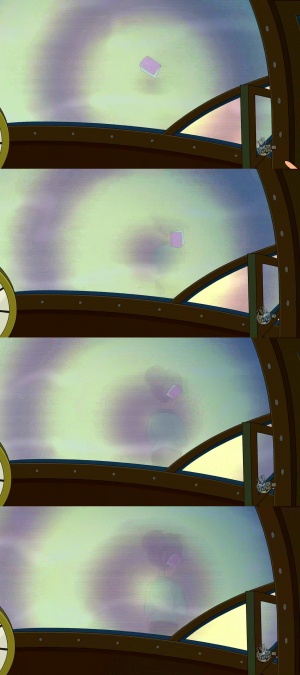
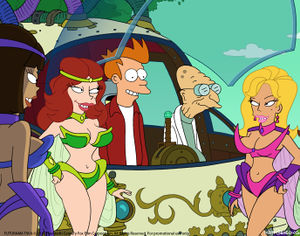
- The story basis is a re-telling of the Poul Anderson novel Flight to Forever.
- The time on the time machine when the trio initially get in reads 7/29 10:05 3010 AD, which is 1000 years to the minute after the scene first aired.
- This also identifies Leela's birth date.
- It also means that Leela and Fry scheduled dinner for some time after 10pm, which is considerably later than the normal dinner time in 21st century culture.
- This is probably the third time the exact date of the episode is given, the first being "Space Pilot 3000" and the second being "Love's Labours Lost in Space".
- When the time machine is accidentally started the first time, one can freeze frame and see Old Leela get hit by the card through the glass (pictured to the right).
- The Twin Towers of the World Trade Center can be seen when the group is travelling through the existence of the second universe. It is covered black, possibly to conceal any resemblance to the real towers.
- In the immediate following shot, however, the Twin Towers are still standing, and have been dwarfed by several other skyscrapers. This may sugest that in the succeding universe, 9/11 never occurred.
- The three books Bender throws in the fire for warmth are The History of the Human Race, Backwards Time Travel Made Easy (written in AL1), and a first-generation Amazon Kindle.
- Adolf Hitler said "Betrachten Sie meinen Schnurrbart!", which translates to "Look at my moustache!".
- In the original cycle of the universe, the Professor unlocks and opens the time machine door using a remote control with a protruding antenna, but in the new cycle, the Professor uses a device that resembles a car key.
- This could be a nod in the direction of the revived series of Doctor Who, where the Tenth Doctor (portrayed by Scottish actor David Tennant) uses both a key and a remote to lock and unlock his own time machine.
- This could also be due to the influence of various changes that have been made to this cycle's history. This would support the CT rather than CU framework. Little changes are possible, but the general "shape" of events stays the same. Determinism would not allow for such, and the key would be the same as the previous cycle's.
- This could be a nod in the direction of the revived series of Doctor Who, where the Tenth Doctor (portrayed by Scottish actor David Tennant) uses both a key and a remote to lock and unlock his own time machine.
- "The Late Philip J. Fry" is the seventh episode of broadcast season 7 and involves time travel. "All the Presidents' Heads" is the seventh episode of broadcast season 8 and also involves time travel.
- When asked to pick their favorite scene in the show, both Matt Groening and David X. Cohen picked a scene from this episode.[13]
- The fashion of the 3050's as well as the design of the time machine resemble steampunk.
- Zoidberg is alive in 3030 which means that he probably hasn't yet experienced the mating frenzy.
- The final Universe appears to have Cartoon Physics as the time machine is unaffected by gravity until the Professor stops talking.
Allusions
- The knight riding an ostrich is a reference to the classic video game Joust.
- The scene with Fry seeing the human, ape, bird, cow and slug versions of the Statue of Liberty is a reference to Planet of the Apes, which ends with the main character seeing the fallen Statue of Liberty, and realising he is on Earth of the future.
- The song during the first time travel montage is based on "In the Year 2525".
- The year five million, with humanity split into two species, one primitive and one intelligent, is a reference to the future depicted in H.G. Wells' The Time Machine. The earlier concept of 3 books that could restore human civilisation - those that Bender throws onto the fire - as well as the visual effect of watching time pass at an acclerated speed from a hand-operated time machine are allusions to the original Time Machine film adaptation.
- The year 10000000, in which the remnants of humanity fight a post-apocalyptic war against the machines, is a reference to the Terminator film series, as well as the Matrix series. The setting resembles Los Angeles in 2029 in The Terminator.
- Watching the temporal end of the universe as a show act is reminiscent of Douglas Adams' novel The Restaurant at the End of the Universe (second part of the Hitchhiker's Guide trilogy), where the end of the universe is used as a regular show act in said restaurant. Unlike this episode, however, the restaurant exists in its own time bubble, which is unaffected by the end of time and space.
- While watching the end of the universe, Fry also utters the phrase: "So long, Earth, thanks for the air and what-not". Considering the setting, this is a clear nod to the title of the novel So Long, and Thanks for All the Fish (fourth part of the Hitchhiker's Guide trilogy).
- When Leela finds Fry's card, she realizes she's wasted the years being angry about something that didn't happen as she thought, a nod to "The Upside of Anger" starring Joan Allen.
- When Farnsworth once again accidentally sends himself, Fry and Bender to the year 10,000, Bender says, "Hand over the keys, Magoo!" This is a reference to the cartoon character Mister Magoo, who was infamously old and nearsighted and got himself in all kinds of hilarious trouble because he didn't wear glasses.
- When the time travel paradoxes are taken care of, Bender shouts, "Yabba-dabba-do!" This is the catchphrase of Fred Flintstone.
- When Fry makes his date with Leela, he dresses in the same outfit as Carl Sagan when he hosted the "Cosmos" series.
- Cubert in the year 3050 resembles Biff Tannen from the Back to the Future series.
- The "Cavern on the Green" restaurant is a reference to the real Tavern on the Green restaurant in New York's Central Park.
- The Professor intends to test the time machine by going forward in time one minute as Einstein the dog does in Back to the Future.
Continuity
- The birthday song Elzar sings to Leela was used in "I Second that Emotion" for Nibbler's party. The traditional "Happy Birthday" song has been copyrighted and it would be very expensive to use, so TV writers often try to find inventive ways around it.
- Curious Pussycat makes its fifth appearance.
- The creation of a forward only time machine is stated to be to prevent against paradoxes. Both Fry[3ACV19] and Bender[BBS] have previously caused such paradoxes.
- The Professor refers to the previous time travel episode "Roswell that Ends Well", saying they won't do something disgusting like sleeping with one's own grandmother.
- Bender briefly refers to his time travelling in Bender's Big Score, saying "Time?! I can't go back there!"
- The concept of time being cyclical was previously mentioned in "The Cryonic Woman" by the man who wanted to meet Shakespeare.
- Interestingly, in that episode Fry claimed time was a "straight line", with confidence suggesting it had been proven, but here we see it is indeed cyclical.
- Despite the defrostee Fry met being correct about the nature of time, his plan was still flawed. He cryogenically froze himself, hypothesising that time cyclical nature would make it possible for him to meet Shakespeare. However the man would have been unable to meet Shakespeare through cryogenics, because the cryogenics lab wouldn't have survived the destruction of Earth like the time machine does. Also, the end of the universe would have occurred somewhere around 10^38 years after the destruction of the planet. Even if the cryogenic tube had miraculously survived Earth’s destruction, the metal in the chamber would have broken down long before the universe would start over. Further, even if the chamber had somehow endured to see the universe restart, the defrostee would need to wait another 13.7 billion years to reach Shakespeare’s time.
- Interestingly, in that episode Fry claimed time was a "straight line", with confidence suggesting it had been proven, but here we see it is indeed cyclical.
- In the end of the episode, as the trio travels into the year 3010, we see moments from several old episodes:
- "Space Pilot 3000" - the destruction of New York City and the medieval reconstruction from when Fry was frozen.
- "Love's Labours Lost in Space" - the Professor showing a hologram of Vergon 6.
- "Amazon Women in the Mood" - Amy, Leela, Zapp and Kif discussing their upcoming double date.
- "Future Stock" - Fry and That Guy waking the crew for a meeting.
- "A Taste of Freedom" - Fry and Zoidberg dancing the Freedom dance.
- The Beast with a Billion Backs - the Professor having been infested by Yivo, scaring Leela, Amy, Hermes and Wernstrom (who is coloured differently from the previous universe).
- "Attack of the Killer App" - Fry, Hermes, Bender, Zoidberg and Amy playing with their eyePhones, and Leela crashing the ship.
- The Professor states that they have one year to go immediately after this scene, implying that a year has passed over the course of the preceding four episodes.
- Once again, Bender plays the washboard, having previously played his body as a washboard in "Bendin' in the Wind".
- The Professor already worked on a time machine as mentioned in "A Clone of My Own", however it was unsuccessful and had set him back 15 years.
- Because the Professor disintegrated Hitler in the second universe, the second universe's Professor couldn't have put his brain into a shark as he claimed he had done in "A Clone of My Own". Considering he was widely criticized for doing this, he might have wanted to kill Hitler solely to save face.
- The weapon the Professor used to shoot Hitler and later Eleanor Roosevelt was the same used by Zapp Brannigan against the holograms of the Holo-Shed.
- The Cavern On The Green was also seen briefly in "Time Keeps on Slippin'" during the panning across the park at the beginning of the episode.
- This marks the second time Hermes is seen as a head in a jar, the first being Bender's Big Score.
Quotes
Elzar: Weren't you the loser who got stood up at my other restaurant?
Leela: Shut up and bring me two dinners!
Fry: Hey, uh... What was the purpose of life, anyway?
Professor Farnsworth: Who knows? Probably some hogwash about the human spirit.
Bender: Mm-hm.
Fry: Sounds about right.
Hedonismbot: Everywhere I looked there were piles of bodies... and then the explosion struck!
Professor Farnsworth: The stars are receding. Oh, the vast emptiness!
[The Professor shakes his empty beer can.]
Bender: Yeah, yeah, I can take a hint.
Fry: That was the old Fry. [Pause.] He's dead now.
Goofs
- Assuming the time machine stays in the same place in New New York because it follows the natural rotation of the Earth, it still would not occupy the same space as the newly formed Earth until the year 3002, when the events of "Crimes of the Hot" move the Earth to a new orbit farther from the Sun. The Earth would be "born" and most of its history happen far away from the forward time machine.
- It is possible that the time machine not only follows the natural rotation of the Earth, but also stays in the same spot no matter where the Earth is.
- And the event went the same as in the "past" universe, so "Crimes of the Hot" would still go down moving the Earth.
- When the duplicate crew is crushed by the time machine that prevented the time paradox, what about the time machine's duplicate? We could assume Professor Farnsworth dismantled it to prevent that paradox. We could also assume that nonsentient machines aren't affected by such paradoxes.
- If this is an entirely new universe, the versions of Fry, Bender and the Professor that were crushed by the time machine are not technically paradoxes, but independently identical versions of the three. Therefore, we can assume that the duplicate time machine's continued existence does not pose a paradox either. This basically means that the trio killed their innocent counterparts in the new universe, who were not paradoxes and posed no threat to causality. This is, however, unsupported by the CT model.
- When Leela returns from The Cavern on the Green. Zoidberg's trousers are white for the first half of the scene.
- When we see the events of The Beast with a Billion Backs, Wernstrom is coloured incorrectly.
- When we see the events of "Attack of the Killer App", there is no shrapnel flying around in contrast to the original episode. Also, the taco and the spaghetti are gone.
- The ruins of Planet Express in the year 10000 match the current building, not the expanded versions of the year 3030 or 3050. This could be explained by saying the original building stayed in the same place, and the buildings in 3030 and 3050 were simply modular expansions, or in a different location. But if the future buildings are in different places, then Leela couldn't have been knocked down by the birthday card
- The Time Machine was moving forward through time so quickly that it was impossible to make out anything outside of the window, as we can only vaguely see future Leela. The expanded versions could have been destroyed completely and only the original building was partially standing.
- 1 time in the time lapse to show the Flood Era, the time machine moves slightly up and to the side, changing the place where they are, and should in fact no longer be in the Planet Express building in the 2 new iterations of the universe.
- This may have been intended, since when they finally come back, they are above the original Fry, Bender and Farnsworth.
- Before stopping the time machine, the Professor says it's just one more year, but just before that we saw scenes from "Attack of the Killer App", that is set less than a month earlier.
- This may just mean that even if he hadn't fallen over, they'd have been late. Also, in the Duh Vinci Code, Fry and Hubert travelled for 2 months between Earth and the Vincians planet
- The slot that the handle slides through on the controller changes twice. From being longer and extending backwards where it should technically be backwards time travel to not having a slot available for going forward in time.
- Despite having survived being completely flattened, paradox Bender died because he was crushed.
- Alternatively, he may have been immobilised, muted and buried alive. It's possible that he simply agreed with being buried alive, since in "Roswell that Ends Well" he said that he enjoyed the thousand years of being buried in the ground. Also, being flattened once could've weakend him, allowing him to be crushed.
- In the year five million the human race has evolved into intelligent pink creatures and Dumblocks but in the year ten million it's back to normal.
- The reason for this could be that human evolution started all over again with the Dumblocks, who evolved into humans.
- It's possible that a few humans remained.
- Though it's fairly logical that only one group of humans evolved into the pink creatures and Dumblocks's, with a chronospecies morphologically more similar to Homo sapiens sapiens surviving and later taking back the Earth
- Humans could also have been brought back by The Last Encyclopod.
- When the Professor gets out of the time machine to kill Hitler, the time machine doesn't move (only moves through time), so he couldn't have gotten to Germany to kill Hitler.
- He may have only used the teloportation bit at that one point.
- The Professor and Bender don't seem to be surprised to find that the dinosaurs were killed by a giant brain. Further, why was Bender so excited to see dinosaurs anyway? They'd been cloned by the 31st century, Bender's seen them before.
- He probably never saw footage of the very first generation of dinosaurs. Also, the Brain Spawn might have wiped their memories of it.
- In "A Fishful of Dollars" Amy states that cows are extinct, however, in the year 10000 a cow civilization has existed at some point between 3050 and 10000.
- The Encyclopod may be responsible for this.
- Older Leela is knocked to the floor by a floating birthday card. Even with the many problems of old age, it is still impossible for a person to get knocked over by something that is that much smaller and lighter than them. If emerging from the time machine increased its kinetic energy, it would make more sense for the card to simply crumple when hitting Leela, due to the ratio of their mass as well as the material the card is made of. However, one can argument that the force of the card would still be a function of mass times acceleration.
- Since time progresses regardless of whether the universe ends, it can be assumed that every other episode will take place billions of years in the future.
- After the big bang is seen by the crew, the timeship starts to show years in B.C. rather than A.D., the way that the Professor programmed his machine should make the machine show the year in A.D. from the previous cycle.
- Given the inconsistency of time in general, and how difficult it would be to actually calculate it, it is more likely that the time machine observes the universe around it and decides on what time it is based on that. It would therefore make good sense for it to show BC when it came around.
- BC was probably added in hopes of adding backwards travel at a later date. Additionally, Farnsworth may have manually reset the clock on seeing the Big Bang. However, this could account for the inaccuracy of Farnsworth's countdown.
- Years are still displayed on the time machine clock after the Earth was destroyed and before it was formed. However, a vast majority of the time that they are in is during these, and without Earth, years do not exist.
- Well, technically they do, there's just no way to re-calibrate it if it slipped out of alignment, as the reference point was gone.
- After the events of Bender's Big Score, Bender could still remember the code for the time sphere and if so would be able to go backwards in time. While it was blanked from his memory during the course of the episode, and burned off of Fry's buttock, Bender used it one last time afterwards and may have memorized it.
- Nibbler could've erased it from his memory.
- Bender, Fry and the Professor technically didn't have to go around again after they missed 3010 the first time. They could have just gone forward to 50,000,000 and used the ladies' time travel method.
- It's probably easier to go around again then get out, deal with the ladies and then use their time machine.
- In the scene where the droplets of water start to form Leela's love letter, the other stalagmites nearby don't grow up as well.
- This is logical because there is no longer water falling on those, the holes she made could have altered the flow completely.
- Since, in Bender's Big Score, the tattoo on Fry's butt had no origin, yet was still used, a similar idea could have been used in this episode to get the time code back. Here's how: Bender comes back from a minute in the future, and gives Original Bender the time code. We still don't know how Future Bender got the time code. Then we wait a minute, and Original Bender jumps back in time to give "Past Bender" the time code. We are now left with one Bender, who has the time code.
- However the tattoo paradox had simply appeared, for this to work the crew would have to able to wish a paradox into existence.
- During Bender's "hambone break", a fiddle can be heard accompanying the music, even though Bender and the fembot are only playing a washboard and a jug.
- It's possible Bender had a tape recording of a fiddle.
- When Fry starts to record the birthday message on the card, you see Bender's head turn. However, when Leela reads it years later, Bender's head doesn't move.
- It's possible the card cut that out of the video.
- When Fry, the Professor and Bender travel to the year 105105, Bender pulls the Professor into the time travelling machine to get away quickly, however, when he pulls him in he completely disappears.
- After saying that the Earth is dead, Professor Farnsworth says, "This is the end of all things!" However, there are still presumably other planets probably hosting other lifeforms.
- It could be possible that he was exaggerating.
- Another possibility is that even if life existed on other planets, they had no way of getting to them.
- Amy and Hermes are both shown as head jars in the year 3050, but they should still be alive as they're only 70 and 91 respectively and, in the 31st century, this period of life has been shown to be comparable to the 'middle-age' of our time.
- Amy and Hermes could have lost their bodies due to disease or injury, thus having the need to keep their heads in jars.
- Possibly his body was stolen by Bender during Bender's Big Score.
- In the scene where machines are overthrowing humanity the soldiers are using the exact same laser guns as the DOOP army uses and wearing identical uniforms even though it's been a million years.
- The DOOP may still exist.
- In the beginning of the episode, a pot of coffee is dumped on Fry. As we see in the window, the sun is near the horizon. When we see his clock, it turns out that it is 11:55 AM. At that time, the sun should be almost directly above, rather than near the horizon.
- When Fry enters the Cavern on the Green for the first time, he is standing by the words "Dear Fry,". Yet when Leela carves the message, she enters and exits from "Leela". Fry ia then shown to leave from "Leela" as well.
Alien Language Sightings
Time: 7:48
Location: Book thrown into the fire by Bender
Language: AL1
Translation: Backwards Time Travel Made Easy
Appearances
Characters
- Adolf Hitler
- Amy
- Atanarjuat and Fufu
- Bender
- Debut: Crapface Fellows
- Cubert
- Debut: Dumblocks
- Debut: Eleanor Roosevelt (mentioned in speech only)
- Elzar
- Fry
- Hedonismbot
- Hermes
- Hypnotoad
- Debut: Intellectually and morally advanced creatures
- Kif (montage)
- Debut: Ladies of 50,000,000 AD
- Leela
- Linda
- Morbo
- Debut: Promiscuous Ladybot
- Professor Farnsworth
- That Guy (montage)
- Debut: Waiter on the Green
- Wernstrom (montage)
- Zapp (montage)
- Zoidberg
Places
Episode Credits
- Writer
- Director
- Voice Actors
- DVD Commentary
References
- ^ a b c "Primetime Emmy Awards nominations for 2011". Emmy Awards. Retrieved on 11 September 2011.
- ^ a b "PatchChord_Adams" (22 October 2009). ""Hot Diggity Daffodil, Futurama's back!" (News thread) (No spoilers)" Page 2. (PEEL.) Retrieved on 22 October 2009.
- ^ a b "'The fans seemed to like the same ones that we did. We had an episode titled “The Late Philip J. Fry” which was a huge science-fiction epic and we are submitting it for the Emmys. In the episode, Fry is trying to make it on time to a birthday dinner date for Leela, but he’s sidetracked by Professor Farnsworth’s time machine, which only goes forward into the future, so he keeps having to go forward to the future until a backwards time machine is invented. The episode appealed to both sci-fi fans and romance fans because it had a good emotional story behind it as well." — Cohen, David X.
Cohen, David X. (16 June 2024). Cohen Spills the Beans on Futurama's New Season. Retrieved on 16 June 2011. Cite error: Invalid<ref>tag; name "Cohen" defined multiple times with different content - ^ a b Seidman, Robert (30 July 2010). "Thursday Cable: Jersey Shore on Top + Burn Notice, Futurama, Project Runway & More". TVbythenumbers. Retrieved on 30 July 2010.
- ^ a b c Handlen, Zack (29 July 2010). ""The Late Philip J. Fry"". The A.V. Club. Retrieved on 29 July 2010.
- ^ Canning, Robert (30 July 2010). Futurama: "The Late Philip J. Fry" Review. (IGN.) Retrieved on 30 July 2010.
- ^ a b Barr, Merrill (30 July 2010). "Review: Futurama — The Late Philip J. Fry". Film School Rejects. Retrieved on 30 July 2010.
- ^ Gandert, Sean (30 July 2010). "Futurama Review: "The Late Philip J. Fry" (6.7)". Paste. Retrieved on 30 July 2010.
- ^ Fitzpatrick, Kevin (24 July 2010). "Comic-Con 2010: Futurama Goes To The Future?". UGO. Retrieved on 25 July 2010.
- ^ a b LaMarche, Maurice: "Nah. Turns out I'm all good, cold-wise. On to the Futurama table-reading, Bitterman!! And go through the park. You know how I love the park... [...]"
LaMarche, Maurice: "We're table reading episode 7 today.[...]"
Zaugh, Bob: "Best Futurama table read ever!! Its [sic] the Emmy shot!!"
LaMarche, Maurice: "I think so, too! That script hit on all levels. Hilarious, touching, meaningful, philosophical, even metaphysical. And did I mention, hilarious?"
LeMarche, Maurice (21 October 2009). Maurice LaMarche. (Facebook.) Retrieved on 29 July 2010. - ^ 63rd Primetime Emmy® Awards (PDF). 14 July 2011. Retrieved on 14 July 2011.
- ^ Tobey, Matt (23 June 2010). "Countdown to Futurama: Time Travel". Comedy Central Insider. Retrieved on 23 June 2010.
- ^ Nerdist (06 September 2013). Futurama Live! Pre-Show w/ Matt Groening, David X. Cohen, Phil LaMarr and more! (7:00). (YouTube.) Retrieved on 10 September 2013.
